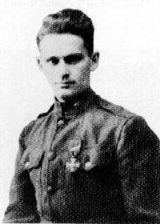
William March
Topics
William March
Quotations

Quotations
William March was an American soldier and author, most famous for his novels The Bad Seed and Company K. His innovative writing style is characterized by a deep compassion and understanding of suffering. A champion of the poor and disadvantaged, March often presents characters who, through no fault of their own, are victims of chance. He argues that true freedom is only obtained by being true to one's nature and humanity.
Sourced
- The time comes in the life of each of us when we realize that death awaits us as it awaits others, that we will receive at the end neither preference nor exemption. It is then, in that disturbed moment, that we know life is an adventure with an ending, not a succession of bright days that go on forever. Sometimes the knowledge come with the repudiation and quick revolt that such injustice awaits us, sometimes with fear that dries the mouth and closes the eyes for an instant, sometimes with servile weariness, an acquiescence more dreadful than fear. The knowledge that my own end was near came with pain, and afterwards astonishment, with the conventional heart attack, from which, I've been told, I've made an excellent recovery.
- Entitled "Poor Pilgrim, Poor Stranger", Found in the typewriter the morning of his death.
This Heavy Load (1931)
- ...man...is a frail, lost creature, too weak to walk unaided.
Company K (1933)
- If the common soldiers of each army could just get together by a river bank and talk things over calmly, no war could possibly last as long as a week.
- I have never ceased to wonder at the thing we call human nature, with its times of beauty and its times of filthiness, or at the level of calm stupidity that lies in between the two.
- You can always tell an old battlefield where many men have lost their lives. The next spring the grass comes up greener and more luxuriant than on the surrounding countryside; the poppies are redder, the corn-flowers more blue. They grow over the field and down the sides of the shell holes and lean, almost touching , across the abandoned trenches in a mass of color that ripples all day in the direction that the wind blows. They take the pits and scars out of the torn land and make it a sweet, sloping surface again. Take a wood, now, or a ravine: In a year's time you could never guess the things which had taken place there.
- ...To me it has always seemed that God is so sickened with men, and their unending cruelty to each other, that he covers the places where they have been as quickly as possible.
The Tallons (1936)
- People are born in sorrow and move about the earth in patterns of sorrow without sense and without plan. Why should I take myself so seriously? I am no more important to the Creator than the trees or the vegetation which live with me on His earth. There is no eye to watch over me nor a hand to direct me, and there will be no preferred fate for me at the end, no matter what I am, or what I do with my life.
- In the sight of my beloved, I am like iron that the smith has heated at his furnace: iron whose surface gives heat. I am a bar that is rigid and will not bend.
The Looking-Glass (1943)
- Everybody must seem crazy if you see deep enough into their minds.
About William March
- The unrecognized genius of our time.
- His book has the force of a mob-protest; an outcry from anonymous throats. The wheel turns and turns and it does not matter, one hardly notices that the captain of the company, killed on page 159, is alive again a hundred pages later. It does not matter that every stock situation of the war, suicide, the murder of an officer, the slaughter of prisoners, a vision of Christ, is apportioned to Company K, because the book is not written in any realistic convention. It is the only War-book I have read which has found a new form to fit the novelty of the protest. The prose is bare, lucid, without literary echoes, not an imitation but a development of eighteenth-century prose.
- In a Graham Greene review of the novel Company K for the newspaper The Spectator.
- The most underrated of all contemporary American writers of fiction.
- It's queer about this book--it suddenly made me wonder whether any other book about the War has been written in this country. It's a book of extra-ordinary courage--not the courage of hope but the quiet courage of despair. It will make patriots and romanticists angry--yet it is the kind of patriotism that is hardest and toughest. It ranks at once with the few great cries of protest. It is a selected, partial, bitter picture, but a picture we need. It will live. None of the acts of bravery for which the author was decorated during the War was as brave as this anthology of dismay.
- ...Far beyond the confines of a novel; at a single stroke he invented and perfected a new form. No man could write the gigantic story that lies behind 'Company K,' but William March, by a brilliant refinement of form, has given us its essence and its broad sweep, flashes of its intensity and rich variety.
- Harold Strauss, from the 1933 Review of Company K for the New York Times.
Silverdale Interactive © 2026. All Rights Reserved.

